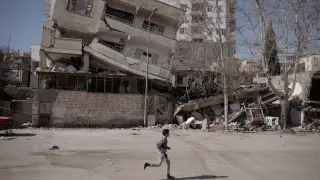Tengrinews.kz - What is the difference between anxiety, fear, and phobia? How does the fear of earthquakes - seismophobia - arise, what is its danger, and can it be managed? These and other questions were answered by the chief specialist of the Medical-Psychological Service of the Ministry of Emergency Situations (MES), Daulet Uysimbekov.
According to Uysimbekov, when a person doesn't know what they are afraid of, they experience an anxious state. The person feels anxiety, an inexplicable unease that overwhelms them.
In turn, when a specific object or event triggers fear, it is referred to as fear. For example, if an earthquake occurs, it triggers fear of that event. The extreme form of fear is phobia, when a person is unable to control their fear. The phobia of earthquakes is called seismophobia.
"Phobias most often develop in people who have experienced strong stress during an earthquake, such as the loss of loved ones. It can be caused by psychological trauma, not necessarily a tragic event, but something that the person perceived as traumatic. For example, if someone was already afraid of earthquakes, strong tremors that put their life and the lives of their loved ones at risk can lead to phobia," said the psychologist of the Ministry of Emergency Situations.
According to the psychologist, the duration of fear after an earthquake depends on individual characteristics and can last from several days to weeks. If anxiety persists for several months, a phobia may develop. In such cases, it is recommended to consult a psychologist.
The specialist noted that the fear of earthquakes is not limited to residents of seismically active regions. For example, in Japan, where earthquakes are frequent, people are calm about them, fully aware that they could happen at any moment.
"Fear often arises from not knowing how to act in an emergency. Panic can amplify the danger, so it’s important to know the basics of safety. The ministry conducts training so that people are prepared for emergencies," the psychologist warned.
Daulet Uysimbekov noted that preparing an emergency kit can help manage fear, especially for people with an organized mindset. It is also helpful to study evacuation plans and routes. In emergencies, people are prone to fear, and each individual requires a personalized approach: listening, support, or physical contact.
"After the earthquakes in Almaty, there were many calls to the hotlines, but they soon stopped. People went out into society, communicated, and shared emotions with others who had experienced the event, which helped them calm down. The psyche tends to get tired of anxiety," added MES employee.
To calm down during an earthquake, the psychologist advises focusing on the main thing—saving oneself and loved ones. For this, it is necessary to assess the situation and evaluate it correctly.
"The first reaction to danger is 'freeze or flee.' If we decide to flee, we need to take necessary items and find a safe place. Some people may freeze, and in that moment, the support of another person is important," added Daulet Uysimbekov.
As a reminder, on the morning of November 5, an earthquake occurred in the Almaty region and Almaty. The epicenter of the earthquake was located in Kazakhstan, 33 kilometers east of Almaty. In the megacity, the tremors were felt with a magnitude of 3 points, while in Talgar, they reached 4 points.

